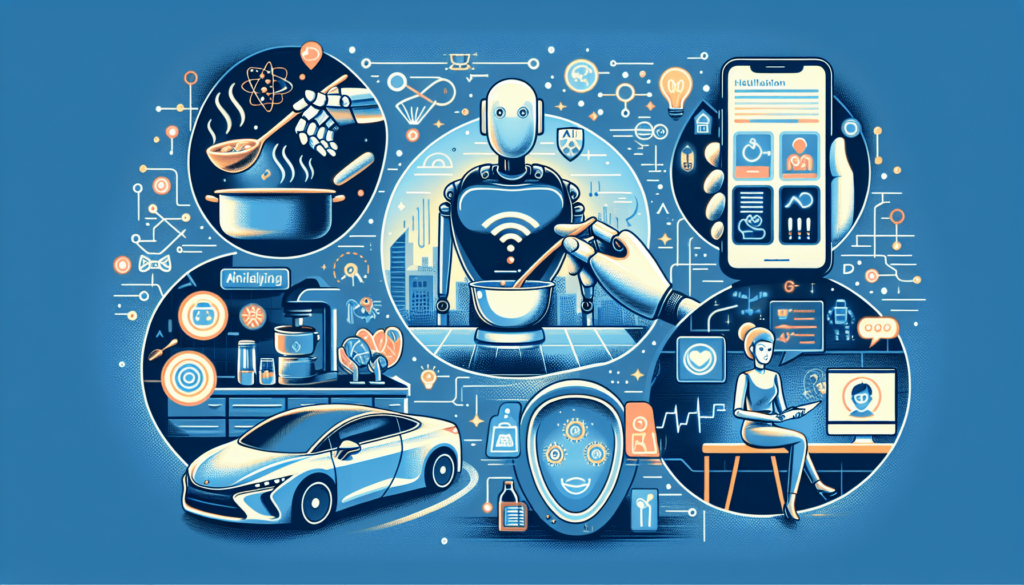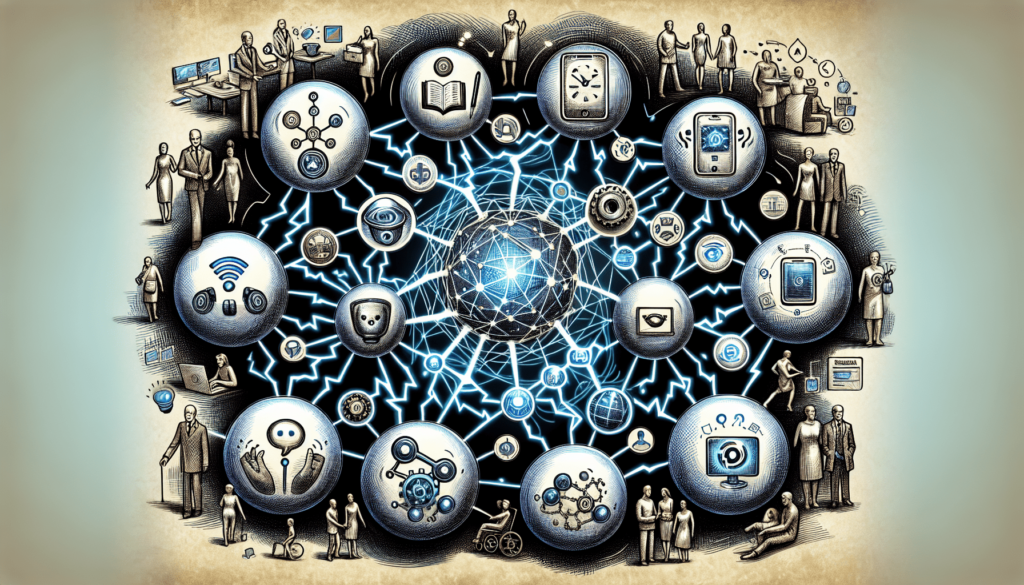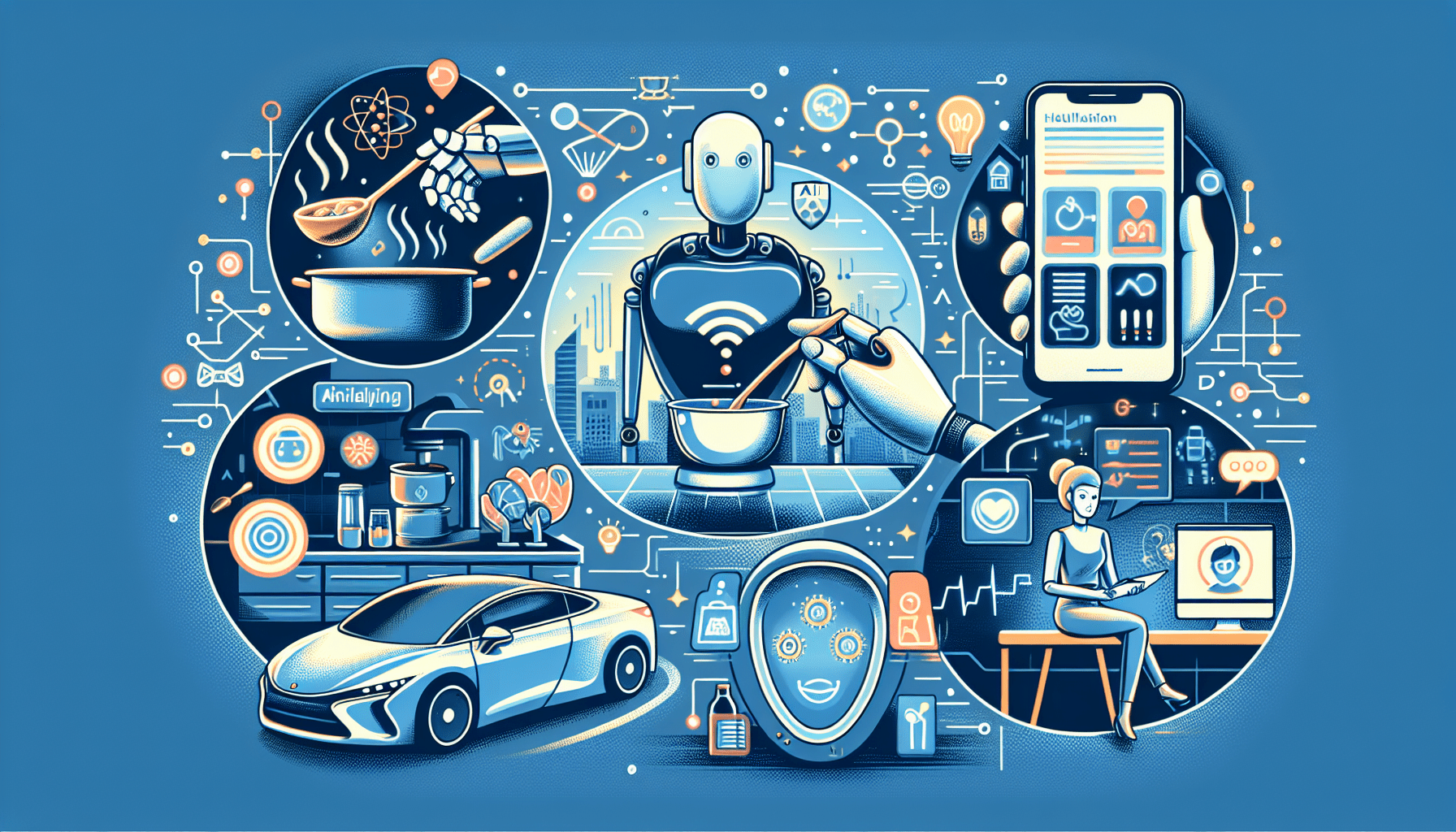Get ready to discover 5 common uses of Artificial Intelligence (AI) that you encounter in your daily life without even realizing it. AI has become increasingly integrated into various aspects of our daily routines, from helping us search for information online to providing personalized recommendations for our entertainment choices. This article will give you a sneak peek into these everyday applications of AI that have become an integral part of our modern lives. So, let’s dive in and explore the ways AI is making our lives easier and more convenient!

Virtual Personal Assistants
Virtual personal assistants, powered by artificial intelligence (AI), have become increasingly popular in recent years. These intelligent digital helpers can perform a wide range of tasks, making our lives easier and more organized. One of the main features of virtual personal assistants is their voice recognition and command capabilities. You can simply speak to your assistant, and it will understand your instructions and carry out the designated tasks. Whether you want to set a reminder, send a message, or play your favorite song, a virtual personal assistant can handle it all.
Another useful feature of virtual personal assistants is their scheduling and reminders functionality. They can help you keep track of important events, deadlines, and daily routines. With just a few taps or voice commands, you can add appointments to your calendar, set alarms, and receive timely reminders. This can greatly improve your productivity and help you stay organized in your personal and professional life.
In addition to managing your schedule, virtual personal assistants can also assist you with email and communication management. They can read your emails aloud, compose and send responses, and even manage your inbox by categorizing messages and prioritizing important ones. This not only saves you time and effort but also ensures that you never miss any important messages or appointments.
Smart Home Devices
Smart home devices, powered by AI, have revolutionized the way we interact with our living spaces. One of the key features of these devices is their ability to control lights, thermostats, and appliances with voice commands or through smartphone apps. Imagine being able to turn off the lights, adjust the temperature, or start brewing a cup of coffee without even getting out of bed. Smart home devices make all of this and more possible, providing convenience and energy efficiency.
Home security and monitoring have also been greatly enhanced by smart home devices. AI-powered cameras and sensors can detect unusual activities, such as unauthorized access or suspicious movements, and notify you in real-time. With the ability to monitor your home remotely through smartphone apps, you can have peace of mind knowing that your property is secure even when you’re away.
Furthermore, smart home devices offer voice-controlled entertainment systems. You can ask your AI assistant to play your favorite songs, podcasts, or audiobooks, and it will stream them directly to your sound system. With the integration of streaming services and smart TVs, you can even control your entertainment experiences through voice commands, making it more convenient and immersive.
Recommendation Systems
AI-powered recommendation systems have become an integral part of our online experiences. Personalized movie and music recommendations, based on your preferences and previous choices, are now a common feature on various streaming platforms. These systems analyze your viewing or listening history and use algorithms to suggest content that matches your interests. This enhances your entertainment experience by introducing you to new and relevant options, catering to your unique tastes.
Beyond entertainment, recommendation systems also play a significant role in e-commerce platforms. When you shop online, AI algorithms analyze your browsing and purchase history to provide personalized product recommendations. This not only helps you discover relevant products but also improves your overall shopping experience. Whether it’s clothing, electronics, or home decor, AI-powered recommendation systems can assist you in finding the perfect item.
Additionally, social media platforms leverage recommendation systems to curate content for their users. By analyzing your interactions, preferences, and connections, AI algorithms determine what kind of posts, articles, or videos you might be interested in. This ensures that your social media feeds are filled with content that resonates with you, allowing you to stay informed and engaged in topics that matter to you.
Healthcare
AI technologies are transforming the healthcare industry, enabling improved diagnosis, treatment, and patient care. Medical diagnosis and treatment recommendations are being enhanced by AI algorithms that can analyze vast amounts of patient data and medical literature. This helps doctors and healthcare professionals make more accurate diagnoses and identify effective treatment plans. AI systems can analyze symptoms, medical imaging, and patient history to provide valuable insights, leading to better patient outcomes.
In addition to diagnosis and treatment, AI enables remote patient monitoring. Wearable devices and sensors can collect data on various health parameters, such as heart rate, blood pressure, and sleep patterns. This information is then analyzed by AI algorithms to detect any abnormalities and provide timely alerts to both patients and healthcare providers. Remote patient monitoring allows for more efficient and proactive healthcare, reducing the need for unnecessary office visits and enabling early intervention.
Furthermore, AI is contributing to the field of drug discovery and development. By analyzing vast amounts of biomedical data, AI algorithms can identify patterns, relationships, and potential drug candidates. This accelerates the drug discovery process and enables scientists to explore new treatment options for various diseases. AI-powered systems can also assist in clinical trials by identifying suitable participants and analyzing trial results, making the drug development process more efficient and effective.

Autonomous Vehicles
The emergence of autonomous vehicles powered by AI has the potential to revolutionize transportation as we know it. Self-driving cars and trucks are becoming a reality, promising improved safety, efficiency, and convenience. These vehicles use a combination of sensors, cameras, and AI algorithms to navigate the roads and make decisions in real-time. By removing the need for human drivers, autonomous vehicles can reduce the risk of human error and accidents, potentially saving countless lives.
While fully autonomous vehicles are still being developed, AI is already making an impact through driver assistance systems. These systems use AI algorithms to interpret data from sensors and cameras, providing assistance to human drivers. Features such as adaptive cruise control, lane-keeping assist, and automatic emergency braking enhance the safety and comfort of driving. AI-powered navigation systems also help in optimizing routes and avoiding traffic congestion, making journeys more efficient.
Moreover, AI technology contributes to traffic prediction and optimization. By analyzing large amounts of traffic data, AI algorithms can predict traffic patterns, congestion, and bottlenecks. This enables cities and transportation authorities to optimize traffic flow and plan infrastructure improvements accordingly. AI-powered systems can suggest alternate routes to avoid heavy traffic, reducing travel time and improving overall transportation efficiency.
Fraud Detection
AI plays a crucial role in fraud detection and prevention across various industries. Credit card fraud monitoring relies on AI algorithms that analyze transactions, detect suspicious patterns, and identify potential fraudulent activities. By continuously learning from large datasets and adapting to new fraud techniques, AI systems can identify and block fraudulent transactions in real-time, protecting both consumers and businesses.
In addition to credit card fraud, AI helps in preventing identity theft. By analyzing multiple data points and behavior patterns, AI algorithms can detect any indications of identity theft or unauthorized access. These systems can flag suspicious activities, such as unusual logins or attempts to access sensitive information, and notify the user or relevant authorities promptly. This proactive approach reduces the risk of identity theft and provides an additional layer of security in our digital lives.
Furthermore, AI-powered systems enable the detection of suspicious activity in various domains. Whether it’s monitoring financial transactions, social media interactions, or network traffic, AI algorithms can identify anomalies and patterns that indicate potential threats or malicious behavior. By constantly analyzing and learning from vast amounts of data, AI systems enhance security and protect against fraud in real-time.
Virtual Customer Service
Chatbots and voice assistants are increasingly being used in customer service to provide quick and efficient support. Chatbots, powered by AI natural language processing, can handle common customer queries, provide information, and even assist in basic troubleshooting. They are available 24/7 and can handle multiple conversations simultaneously, ensuring a seamless customer experience and reducing waiting times.
Voice assistants, such as interactive voice response (IVR) systems, offer another layer of customer service. By leveraging speech recognition and AI algorithms, these systems can understand and respond to customer inquiries and provide automated support. From checking order status to providing product information, voice assistants can assist customers in a natural and conversational manner, eliminating the need for long wait times or extensive interactions with human agents.
Additionally, AI-powered systems enable automated ticketing and issue resolution. By analyzing customer tickets and previous interactions, AI algorithms can understand the nature of a problem and suggest relevant solutions or escalate tickets to appropriate departments. This streamlines the customer support process, reduces resolution times, and improves overall customer satisfaction.
Financial Services
The financial industry has embraced AI technology to enhance various processes and improve customer experiences. automated investment advice, also known as robo-advisors, uses AI algorithms to analyze customer data, risk profiles, and market trends to provide personalized investment recommendations. This enables individuals to access investment advice and manage their portfolios more efficiently, even without extensive financial knowledge or the need for human advisors.
Risk assessment and fraud prevention are also areas where AI has made significant advancements in the financial sector. AI algorithms can analyze vast amounts of data, such as transaction history, credit scores, and behavioral patterns, to assess the risk of lending or investment decisions. This helps financial institutions make informed decisions and minimize potential losses. Additionally, AI systems can detect and prevent fraudulent activities by analyzing patterns and anomalies in transactions or account behaviors.
Moreover, AI plays a role in algorithmic trading and portfolio management. By analyzing market data, news, and historical trends, AI algorithms can make predictions and execute trades at high speeds. This provides opportunities for automated trading strategies and better portfolio management, optimizing investment returns and reducing risks associated with human emotions and biases.
Education
AI technology is transforming the education sector, offering personalized learning experiences tailored to individual needs and learning styles. AI-powered platforms can analyze student data, such as performance, preferences, and progress, to provide customized learning paths and recommendations. This enhances the learning process by adapting the content and pace to each student’s abilities and interests, fostering engagement and motivation.
Automated grading and feedback are additional benefits of using AI in education. AI algorithms can analyze written assignments, quizzes, and exams, providing instant feedback and evaluations. This saves time for teachers and students, allowing for more efficient learning and timely interventions when necessary. AI-powered grading systems can also reduce grading biases and provide consistent and objective evaluations.
Furthermore, virtual tutors and language learning apps leverage AI to enhance language acquisition and practice. These systems can understand and respond to spoken language, offering conversational practice, pronunciation correction, and vocabulary building. AI-powered virtual tutors simulate human interactions and adapt the learning experience based on the student’s progress, making language learning more interactive and effective.
Entertainment and Gaming
AI has made significant contributions to the entertainment and gaming industries. AI-powered video games provide more immersive and challenging experiences by simulating intelligent behaviors in non-player characters (NPCs). NPCs can learn and adapt to player strategies, making gameplay more dynamic and realistic. AI algorithms also contribute to game design, generating procedural content or designing levels based on predefined parameters, expanding the possibilities for creativity and replayability.
Virtual reality (VR) experiences benefit from AI technologies, creating more immersive and interactive environments. AI algorithms can interpret user inputs and movements, reacting in real-time to provide a seamless VR experience. From realistic interactions with virtual objects to intelligent NPCs within virtual worlds, AI-powered VR experiences enhance entertainment, training, and simulations.
Predictive content curation is another application of AI in entertainment. Streaming platforms, social media, and news platforms leverage AI algorithms to analyze user preferences, behavior, and content consumption patterns. This enables them to recommend personalized content and accurately predict what users might enjoy or find interesting. Whether it’s movies, TV shows, articles, or news, AI-powered content curation ensures that you discover relevant and engaging content that aligns with your preferences.
In conclusion, artificial intelligence has found its way into various aspects of our daily lives. From virtual personal assistants and smart home devices to healthcare, autonomous vehicles, fraud detection, virtual customer service, financial services, education, and entertainment, AI technologies are reshaping the way we live, work, and interact with the world around us. With further advancements and innovations, the potential for AI to continue improving our daily lives is boundless.
